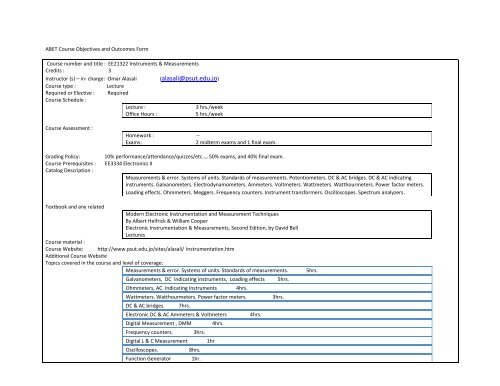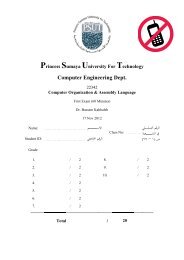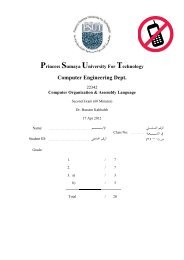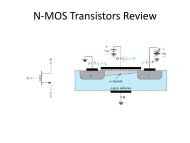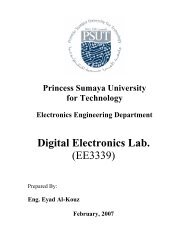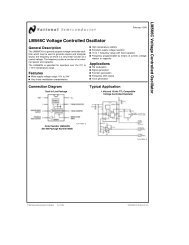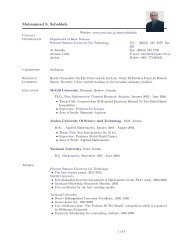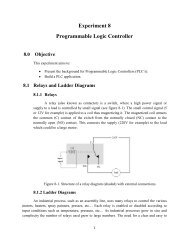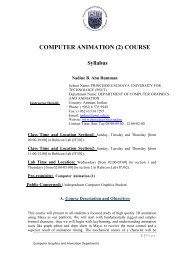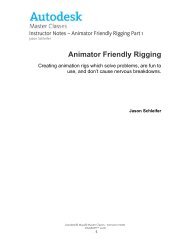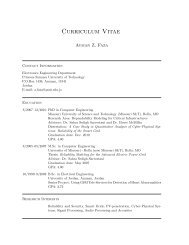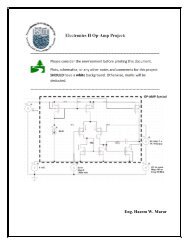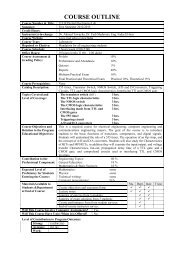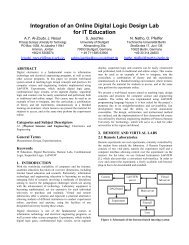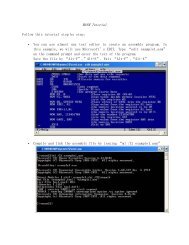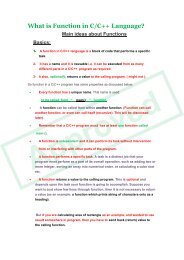ABET Course Objectives and Outcomes Form Course number
ABET Course Objectives and Outcomes Form Course number
ABET Course Objectives and Outcomes Form Course number
Create successful ePaper yourself
Turn your PDF publications into a flip-book with our unique Google optimized e-Paper software.
<strong>ABET</strong> <strong>Course</strong> <strong>Objectives</strong> <strong>and</strong> <strong>Outcomes</strong> <strong>Form</strong><br />
<strong>Course</strong> <strong>number</strong> <strong>and</strong> title : EE21322 Instruments & Measurements<br />
Credits : 3<br />
Instructor (s) – in- charge: Omar Alasali (alasali@psut.edu.jo)<br />
<strong>Course</strong> type :<br />
Lecture<br />
Required or Elective : Required<br />
<strong>Course</strong> Schedule :<br />
Lecture :<br />
3 hrs./week<br />
Office Hours :<br />
5 hrs./week<br />
<strong>Course</strong> Assessment :<br />
Grading Policy:<br />
<strong>Course</strong> Prerequisites :<br />
Catalog Description :<br />
Homework : --<br />
Exams:<br />
2 midterm exams <strong>and</strong> 1 final exam.<br />
10% performance/attendance/quizzes/etc…, 50% exams, <strong>and</strong> 40% final exam.<br />
EE3334 Electronics II<br />
Measurements & error. Systems of units. St<strong>and</strong>ards of measurements. Potentiometers. DC & AC bridges. DC & AC indicating<br />
instruments. Galvanometers. Electrodynamometers. Ammeters. Voltmeters. Wattmeters. Watthourmeters. Power factor meters.<br />
Loading effects. Ohmmeters. Meggers. Frequency counters. Instrument transformers. Oscilloscopes. Spectrum analyzers.<br />
Textbook <strong>and</strong> any related<br />
Modern Electronic Instrumentation <strong>and</strong> Measurement Techniques<br />
By Albert Helfrick & William Cooper<br />
Electronic Instrumentation & Measurements, Second Edition, by David Bell<br />
Lectures<br />
<strong>Course</strong> material :<br />
<strong>Course</strong> Website: http://www.psut.edu.jo/sites/alasali/ Instrumentation.htm<br />
Additional <strong>Course</strong> Website<br />
Topics covered in the course <strong>and</strong> level of coverage:<br />
Measurements & error. Systems of units. St<strong>and</strong>ards of measurements.<br />
Galvanometers, DC indicating instruments, Loading effects<br />
Ohmmeters, AC Indicating Instruments<br />
4hrs.<br />
Wattmeters. Watthourmeters. Power factor meters.<br />
DC & AC bridges<br />
7hrs.<br />
Electronic DC & AC Ammeters & Voltmeters<br />
Digital Measurement , DMM<br />
Frequency counters.<br />
Digital L & C Measurement<br />
Oscilloscopes.<br />
Function Generator<br />
3hrs.<br />
8hrs.<br />
1hr.<br />
1hr<br />
4hrs.<br />
4hrs.<br />
5hrs.<br />
3hrs.<br />
5hrs.
Spectrum Analyzer, Instrument transformers, etc… 1hr.<br />
<strong>Course</strong> <strong>Objectives</strong> <strong>and</strong> their relation to the program Educational <strong>Objectives</strong>:<br />
This is required course for electronics, communications <strong>and</strong> computer engineering majors.<br />
The goal of the course is to: Introduce students to Measurements St<strong>and</strong>ards, errors <strong>and</strong> systems of units. Measurement of<br />
electronic parameters including: Voltage <strong>and</strong> current instruments( Galvanometers, analog, electronic <strong>and</strong> digital types).<br />
Instruments for measuring resistance inductance <strong>and</strong> capacitance; including bridges <strong>and</strong> digital types. Power measurement<br />
including power factor, <strong>and</strong> energy instruments. Digital measurement systems. Frequency counter systems. Oscilloscopes both<br />
CRO <strong>and</strong> DSO. Function Generators. Spectrum Analyzers, instrumentation transformers etc…
Contribution of the course to the professional<br />
component:<br />
Engineering Topics: 90 %<br />
General Education: 0 %<br />
Mathematics & Basic Sciences: 10 %<br />
Expected level of proficiency from students<br />
entering the course:<br />
Mathematics:<br />
Physics:<br />
Technical writing:<br />
Computer programming:<br />
Strong<br />
Srong<br />
Not applicable<br />
Not applicable<br />
Material available to students <strong>and</strong> department at end of course:<br />
Available<br />
Students<br />
To available<br />
department<br />
To available<br />
instructor<br />
<strong>Course</strong> objectives <strong>and</strong> outcomes form: X X X NA<br />
Lecture notes<br />
Homework assignments, <strong>and</strong> solutions:<br />
X<br />
X<br />
X<br />
X<br />
X<br />
Samples of homework solutions from 3 students:<br />
X<br />
Samples of exam solutions from 3 students:<br />
X<br />
<strong>Course</strong> performance form from student surveys: X X<br />
End-of-course instructor survey: X X<br />
To available<br />
TA(s)<br />
Will this course involve computer assignments? NO<br />
Will this course have TA(s) when it is offered? No<br />
Level of contribution of course to Program <strong>Outcomes</strong><br />
(a) Strong a) Ability to apply knowledge of mathematics, science, <strong>and</strong> engineering.<br />
(b) Strong b) Ability to design <strong>and</strong> conduct experiments, as well analyze <strong>and</strong> interpret data.<br />
(c) Average c) Ability to design a system, component, or process to meet desired needs.<br />
d) Ability to function in multi-disciplinary teams.<br />
e) Ability to identify, formulate <strong>and</strong> solve engineering problems.<br />
f) Underst<strong>and</strong>ing of professional <strong>and</strong> ethical responsibility.<br />
(g) Average g) Ability to communicate effectively.<br />
h) The broad education necessary to underst<strong>and</strong> the impact of engineering solutions in a global <strong>and</strong> societal<br />
context.<br />
(i) Average i) A recognition of the need for, <strong>and</strong> an ability to engage in life- long learning.<br />
j) A knowledge of contemporary issues.<br />
(k) Strong k) Ability to use the techniques, skills, <strong>and</strong> modern engineering tools necessary for engineering practice.
Upon completion of this course, students will have had an opportunity to learn about the following:<br />
Specific <strong>Course</strong> <strong>Outcomes</strong><br />
Measurements & error. Systems of units. St<strong>and</strong>ards of measurements<br />
Galvanometers, DC indicating instruments, Loading effects<br />
Ohmmeters, AC Indicating Instruments<br />
Wattmeters. Watthourmeters. Power factor meters.<br />
DC & AC bridges<br />
Electronic DC & AC Ammeters & Voltmeters<br />
Digital Measurement , DMM<br />
Frequency counters.<br />
Digital L & C Measurement<br />
Oscilloscopes.<br />
Function Generator<br />
Opportunities to interact weekly with the instructor during regular office hours <strong>and</strong> discussion sections in order to further the students’ learning<br />
experience <strong>and</strong> the students’ interest in the material.<br />
Program<br />
<strong>Outcomes</strong><br />
a, b, g, i, k<br />
a, c, i, k<br />
a, c, i, k<br />
a, c, i, k<br />
a, c, i, k<br />
a, c, i, k<br />
a, c, i, k<br />
a, c, i, k<br />
a, c, i, k<br />
a, c, i, k<br />
a, c, i, k<br />
a, b, c, g, i, k


